原发性失眠主客观睡眠质量与日间功能损害的关系
失眠障碍的合理诊治-024-2019年华医网继续教育答案
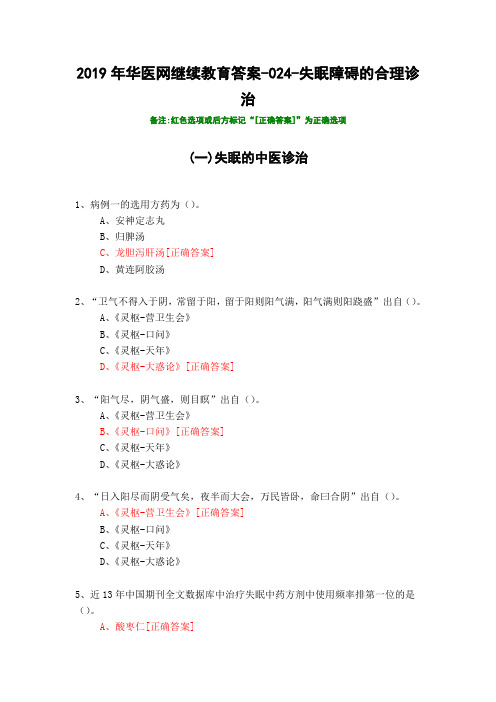
2019年华医网继续教育答案-024-失眠障碍的合理诊
治
备注:红色选项或后方标记“[正确答案]”为正确选项
(一)失眠的中医诊治
1、病例一的选用方药为()。
A、安神定志丸
B、归脾汤
C、龙胆泻肝汤[正确答案]
D、黄连阿胶汤
2、“卫气不得入于阴,常留于阳,留于阳则阳气满,阳气满则阳跷盛”出自()。
A、《灵枢-营卫生会》
B、《灵枢-口问》
C、《灵枢-天年》
D、《灵枢-大惑论》[正确答案]
3、“阳气尽,阴气盛,则目瞑”出自()。
A、《灵枢-营卫生会》
B、《灵枢-口问》[正确答案]
C、《灵枢-天年》
D、《灵枢-大惑论》
4、“日入阳尽而阴受气矣,夜半而大会,万民皆卧,命曰合阴”出自()。
A、《灵枢-营卫生会》[正确答案]
B、《灵枢-口问》
C、《灵枢-天年》
D、《灵枢-大惑论》
5、近13年中国期刊全文数据库中治疗失眠中药方剂中使用频率排第一位的是()。
A、酸枣仁[正确答案]。
失眠的名词解释
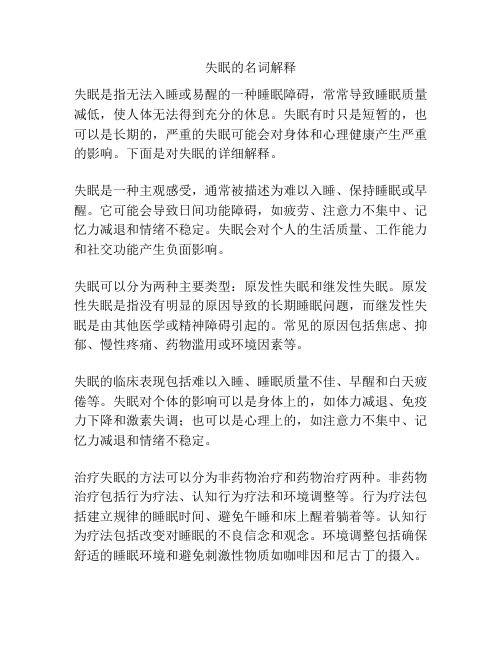
失眠的名词解释失眠是指无法入睡或易醒的一种睡眠障碍,常常导致睡眠质量减低,使人体无法得到充分的休息。
失眠有时只是短暂的,也可以是长期的,严重的失眠可能会对身体和心理健康产生严重的影响。
下面是对失眠的详细解释。
失眠是一种主观感受,通常被描述为难以入睡、保持睡眠或早醒。
它可能会导致日间功能障碍,如疲劳、注意力不集中、记忆力减退和情绪不稳定。
失眠会对个人的生活质量、工作能力和社交功能产生负面影响。
失眠可以分为两种主要类型:原发性失眠和继发性失眠。
原发性失眠是指没有明显的原因导致的长期睡眠问题,而继发性失眠是由其他医学或精神障碍引起的。
常见的原因包括焦虑、抑郁、慢性疼痛、药物滥用或环境因素等。
失眠的临床表现包括难以入睡、睡眠质量不佳、早醒和白天疲倦等。
失眠对个体的影响可以是身体上的,如体力减退、免疫力下降和激素失调;也可以是心理上的,如注意力不集中、记忆力减退和情绪不稳定。
治疗失眠的方法可以分为非药物治疗和药物治疗两种。
非药物治疗包括行为疗法、认知行为疗法和环境调整等。
行为疗法包括建立规律的睡眠时间、避免午睡和床上醒着躺着等。
认知行为疗法包括改变对睡眠的不良信念和观念。
环境调整包括确保舒适的睡眠环境和避免刺激性物质如咖啡因和尼古丁的摄入。
药物治疗通常是作为最后的选择。
药物治疗包括安眠药和抗焦虑药等,但需要严格控制和监测,以避免依赖性和副作用。
预防失眠的方法包括建立健康的睡眠习惯和生活方式,如避免饮酒和吸烟、规律锻炼、保持良好的睡眠环境和避免过度的精神和身体刺激。
总的来说,失眠是一种常见的睡眠障碍,可以通过行为疗法、环境调整和药物治疗等方法来治疗。
预防失眠的关键在于保持健康的生活方式和睡眠习惯。
及早治疗和预防失眠有助于改善睡眠质量和提高生活质量。
《中国成人失眠诊断与治疗指南》节选

《中国成人失眠诊断与治疗指南》节选作者:来源:《中国社区医师》2013年第09期失眠是临床最为常见的睡眠障碍类型。
长期失眠对于正常生活和工作会产生严重负面影响,甚至会导致恶性意外事故的发生。
2002年全球10个国家失眠流行病学研究(问卷调查)结果显示,45.4%的中国人在过去1个月中曾经历过不同程度失眠。
《中国成人失眠诊断与治疗指南》旨在为临床医师提供一套规范化的成人失眠诊疗框架。
在临床实践过程中,医师在参照本指南时仍应结合患者具体病情进行个体化处理。
失眠的诊断失眠的诊断必须符合以下条件。
●存在以下症状之一:入睡困难、睡眠维持障碍、早醒、睡眠质量下降或日常睡眠晨醒后无恢复感。
●在有条件睡眠且环境适合睡眠的情况下仍然出现上述症状。
●患者主诉至少下述1种与睡眠相关的日间功能损害:①疲劳或全身不适;②注意力、注意维持能力或记忆力减退;③学习、工作和(或)社交能力下降;④情绪波动或易激惹;⑤日间思睡;⑥兴趣、精力减退;⑦工作或驾驶过程中错误倾向增加;⑧紧张、头痛、头晕,或与睡眠缺失有关的其他躯体症状;⑨对睡眠过度关注。
失眠治疗的干预方式失眠的干预措施主要包括药物治疗和非药物治疗。
对于急性失眠患者宜早期应用药物治疗。
对于亚急性或慢性失眠患者,无论是原发还是继发,在应用药物治疗的同时应当辅助以心理行为治疗,即使是那些已经长期服用镇静催眠药物的失眠患者亦是如此。
针对失眠的有效心理行为治疗方法主要是认知行为治疗(CBT-I)。
目前,国内能够从事心理行为治疗的人力资源相对匮乏,具有这方面执业资质认证的人员不多,单纯采用CBT-I也会面临依从性问题,所以药物干预仍然占据失眠治疗的主导地位。
应强调睡眠健康教育的重要性,即在建立良好睡眠卫生习惯的基础上,开展心理行为治疗、药物治疗和传统医学治疗。
失眠药物治疗的具体建议尽管具有催眠作用的药物种类繁多,但其中大多数药物的主要用途并不是治疗失眠。
目前,临床治疗失眠的药物主要包括苯二氮革类受体激动剂(BZRAs)、褪黑素受体激动剂和具有催眠效果的抗抑郁药物。
世界睡眠日-带你了解失眠的一些知识

世界睡眠日-带你了解失眠的一些知识失眠的一些概念失眠:世界卫生组织定义失眠为一周内至少有三个晚上出现入睡困难和(或)难以维持睡眠,或者有无法恢复精力的睡眠引起的不适,伴随白天的苦恼或影响社会功能。
原发性失眠:美国精神病学协会规定原发性失眠的病程是1个月,突出的主诉为入睡困难、维持睡眠困难或睡眠质量差。
无论是哪种情况,都必须存在明显的苦恼和白天社会功能的损害,并且不是其他躯体疾病、精神障碍或睡眠障碍的结果。
心理生理性失眠:国际睡眠障碍分类系统用这个术语体现出失眠是如何被激发和维持的。
心理生理性失眠是指由躯体化紧张和习得性阻睡联想导致的以失眠和觉醒状态下的功能受损为主诉的一种精神障碍。
躯体化紧张不仅仅指患者的主观感受,也包括准备入睡时客观测量到的过度的躯体唤醒。
躯体唤醒是以外周神经系统活动为特征,常见表现有肌肉紧张度增加、心率增快、出汗等。
习得性阻睡联想是一种入睡前唤醒的形式,一般限于出现在卧室。
入睡前唤醒常见的指标有入睡前侵入性认知、思维弃逸、思维反当。
失眠的严重程度:一般来说,严重性是根据症状的频率和强度来确定的。
需要注意的是,我们很难规定一个区分正常和异常睡眠时间和频率的界定,因为每个人的年龄,既往睡眠情况和个体基础睡眠需求水平都是有差别的。
频率:大多数临床研究者认为患者每周要至少三个晚上有失眠问题。
强度:大部分临床研究者认为至少30分钟才能入睡或醒后超过30分钟不能再入睡是区分正常与异常睡眠的分界点。
失眠基本疗法介绍刺激控制疗法刺激控制指南限制了清醒时躺在床上的时间和待在卧室或床上的行为,这些限制是为了加强床、卧室、就寝时间与快速而稳定的睡眠之间的联系。
典型的指令包括:①当感觉到困倦时才躺上床;②除了睡眠和性活动外不要在卧室进行其他活动③醒来的时间超过15分钟时离开卧室④再次有睡意时才能回到卧室。
第3条和第4条按需要可重复进行。
最后,不论睡眠量多少,在一周七天内保持一个固定的起床时间。
一些医师为了防止患者的“看时钟”行为,鼓励患者当感到睡醒或者体验到睡不着的烦恼和困扰时就立刻离开卧室。
中国成人失眠诊疗指南

(二)干预方式
失眠的干预治疗主要包括非药物治疗和药物治疗。 对于急性失眠患者宜早期应用药物治疗。 对于亚急性或慢性失明患者,无论是原发还是继
发,在应用药物治疗的同时应当辅助以心理行为 治疗,即使是那些已经长期服用镇静催眠药物的 失眠患者亦是如此。 针对失眠的有效心理行为治疗方法主要是认知行 为治疗(CBT-I)。
2. 在有条件睡眠且环境适合睡眠的情况下仍然出 现上述症状
•American Academy of Sleep Medicine, International classification of sleep disorder , 2nd ed,Diagnostic and coding manual。Westchester:One Westbrook,2005
➢ 多次睡眠潜伏期实验(MSLT):用于发作性睡病和日间 睡眠过度等疾病的诊断与鉴别
➢ 体动记录仪:替代评估夜间总睡眠时间和睡眠模式
➢ 神经功能影像学:诊断与鉴别开拓新视野但设备昂贵,难 以推广
• 失眠诊断必须符合以下条件(1.2.3):
1. 存在以下症状之一:入睡困难、睡眠维持障碍 、早醒、睡眠质量下降或无恢复感睡眠
会持续2~6年 一半以上中重度症状者病程超过2年 经过各种纵向报告我们得知,高达80%的严重
失眠者病情并没有得到缓
多分类系统:ICSD-2、DSM-Ⅳ、ICD-10
按表现形式分:入睡难、长时觉醒/早醒、浅睡
、矛盾性失眠、无休息感性失眠或兼而有之
按病程分:急性、亚急性、慢性
按程度分:轻、中、重
②Байду номын сангаас明确是否存在心境、焦虑、记忆等其他神经精神障碍等 ③ 药物或物质滥用史 ④ 进2-4周的总体睡眠情况,特别是抗抑郁药、镇静药、中枢
原发性失眠的中医临床研究进展
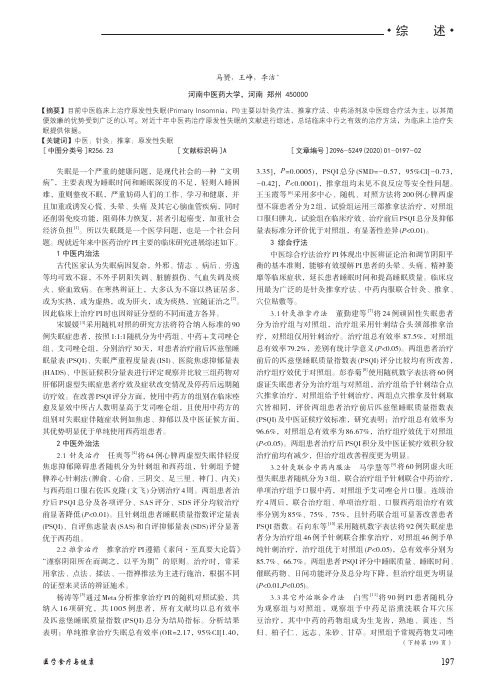
原发性失眠的中医临床研究进展马赟,王峥,李洁*河南中医药大学,河南 郑州 450000【摘要】目前中医临床上治疗原发性失眠(Primary Insomnia,PI)主要以针灸疗法、推拿疗法、中药汤剂及中医综合疗法为主,以其简便效廉的优势受到广泛的认可。
对近十年中医药治疗原发性失眠的文献进行综述,总结临床中行之有效的治疗方法,为临床上治疗失眠提供依据。
【关键词】中医;针灸;推拿;原发性失眠[中图分类号]R256.23 [文献标识码]A [文章编号]2096-5249(2020)01-0197-02失眠是一个严重的健康问题,是现代社会的一种“文明病”,主要表现为睡眠时间和睡眠深度的不足,轻则入睡困难,重则整夜不眠,严重妨碍人们的工作、学习和健康,并且加重或诱发心慌、头晕、头痛 及其它心脑血管疾病,同时还削弱免疫功能,阻碍体力恢复,甚者引起癌变,加重社会经济负担[1]。
所以失眠既是一个医学问题,也是一个社会问题。
现就近年来中医药治疗PI主要的临床研究进展综述如下。
1中医内治法古代医家认为失眠病因复杂,外邪、情志 、病后、劳逸等均可致不寐,不外乎阴阳失调、脏腑损伤、气血失调及痰火、瘀血致病。
在寒热辨证上,大多认为不寐以热证居多,或为实热,或为虚热,或为肝火,或为痰热,宜随证治之[2]。
因此临床上治疗PI时也因辩证分型的不同而遣方各异。
宋媛媛[3]采用随机对照的研究方法将符合纳入标准的90例失眠症患者,按照1:1:1随机分为中药组、中药+艾司唑仑组、艾司唑仑组,分别治疗30天,对患者治疗前后匹兹堡睡眠量表(PSQI)、失眠严重程度量表(ISI)、医院焦虑抑郁量表(HADS)、中医证候积分量表进行评定观察并比较三组药物对肝郁阴虚型失眠症患者疗效及症状改变情况及停药后远期随访疗效。
在改善PSQI评分方面,使用中药方的组别在临床痊愈及显效中所占人数明显高于艾司唑仑组,且使用中药方的组别对失眠症伴随症状例如焦虑、抑郁以及中医证候方面,其优势明显优于单纯使用西药组患者。
失眠多因情志不佳 调理要先疏肝泻火
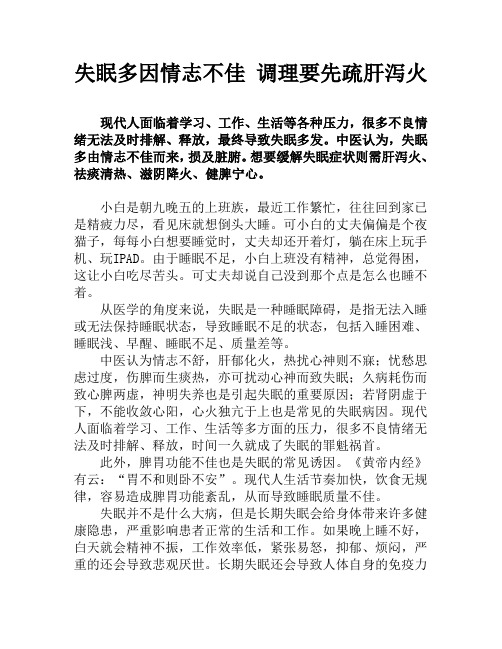
失眠多因情志不佳调理要先疏肝泻火现代人面临着学习、工作、生活等各种压力,很多不良情绪无法及时排解、释放,最终导致失眠多发。
中医认为,失眠多由情志不佳而来,损及脏腑。
想要缓解失眠症状则需肝泻火、祛痰清热、滋阴降火、健脾宁心。
小白是朝九晚五的上班族,最近工作繁忙,往往回到家已是精疲力尽,看见床就想倒头大睡。
可小白的丈夫偏偏是个夜猫子,每每小白想要睡觉时,丈夫却还开着灯,躺在床上玩手机、玩IPAD。
由于睡眠不足,小白上班没有精神,总觉得困,这让小白吃尽苦头。
可丈夫却说自己没到那个点是怎么也睡不着。
从医学的角度来说,失眠是一种睡眠障碍,是指无法入睡或无法保持睡眠状态,导致睡眠不足的状态,包括入睡困难、睡眠浅、早醒、睡眠不足、质量差等。
中医认为情志不舒,肝郁化火,热扰心神则不寐;忧愁思虑过度,伤脾而生痰热,亦可扰动心神而致失眠;久病耗伤而致心脾两虚,神明失养也是引起失眠的重要原因;若肾阴虚于下,不能收敛心阳,心火独亢于上也是常见的失眠病因。
现代人面临着学习、工作、生活等多方面的压力,很多不良情绪无法及时排解、释放,时间一久就成了失眠的罪魁祸首。
此外,脾胃功能不佳也是失眠的常见诱因。
《黄帝内经》有云:“胃不和则卧不安”。
现代人生活节奏加快,饮食无规律,容易造成脾胃功能紊乱,从而导致睡眠质量不佳。
失眠并不是什么大病,但是长期失眠会给身体带来许多健康隐患,严重影响患者正常的生活和工作。
如果晚上睡不好,白天就会精神不振,工作效率低,紧张易怒,抑郁、烦闷,严重的还会导致悲观厌世。
长期失眠还会导致人体自身的免疫力下降,对各种疾病的抵抗能力也随之减弱,若是不及时治疗,久而久之则会导致记忆力减退、头痛、白天精神不振、头昏脑胀、耳鸣、健忘、神经衰弱等。
失眠是由情志而来,损及脏腑。
要想拥有好睡眠则必须疏肝泻火、祛痰清热、滋阴降火、健脾宁心、温胆益气,虚则补之、实则泻之。
失眠可以通过药食内养和经络外调来调养。
按摩调理1、睡前搓涌泉穴。
柏子养心丸联合归脾汤加减治疗老年原发性失眠的前瞻性对照研究

2023年12月第10卷第12期December.2023,Vol.10,No.12世界睡眠医学杂志WorldJournalofSleepMedicine2809 作者简介:庞延萍(1981 02—),女,本科,主治医生,研究方向:中医内科学、神经内科学通信作者:侯晓(1991 03—),女,硕士研究生,主治医生,研究方向:中医内科学、老年病学,E mail:zhrs666999@163 com柏子养心丸联合归脾汤加减治疗老年原发性失眠的前瞻性对照研究庞延苹1 李明婷1 侯 晓2(1聊城市第四人民医院神经内科,聊城,252000;2聊城市第四人民医院老年康复科,聊城,252000)摘要 目的:探究柏子养心丸联合归脾汤加减治疗老年原发性失眠的临床疗效。
方法:选取2020年6月至2023年6月聊城市第四人民医院收治的老年原发性失眠(心脾两虚型)患者100例作为研究对象,按照随机数字表法分为对照组和观察组,每组50例。
对照组给予阿普唑仑片治疗,观察组给予柏子养心丸联合归脾汤加减治疗。
比较2组疗效、中医症状(多梦易醒、心悸、健忘、头晕目眩、神疲乏力)评分和睡眠结构[总睡眠时间(TST)、睡眠潜伏期(SL)、睡眠效率(SE)、觉醒时间(AT)]的差异。
结果:治疗后,观察组的总有效率为94 00%高于对照组的80 00%,差异有统计学意义(P<0 05);2组的各项症状评分、SL、AT均低于治疗前,TST、SE高于治疗前,且观察组症状和睡眠结构改善程度均优于对照组,差异均有统计学意义(均P<0 05)。
结论:柏子养心丸联合归脾汤加减对老年原发性失眠患者的疗效显著,能有效改善中医症状,优化睡眠结构。
关键词 柏子养心丸;归脾汤加减;老年;原发性失眠;心脾两虚型AProspectiveControlledStudyontheCombinationofBaiziYangxinPillandModifiedGuipiDecoctionintheTreatmentofElderlyPrimaryInsomniaPANGYanping1,LIMingting1,HOUXiao2(1NeurologyDepartmentoftheFourthPeople′sHospitalofLiaochengcity,Liaocheng252000,China;2GeriatricRehabilitationDepartment,LiaochengoftheFourthPeople′sHospitalofLiaochengcity,Liaocheng252000,China)Abstract Objective:ToexploretheclinicalefficacyofBaiziYangxinPillcombinedwithModifiedGuipiDecoctioninthetreat mentofelderlyprimaryinsomnia Methods:FromJune2020toJune2023,100elderlypatientswithprimaryinsomnia(heartspleendeficiencysyndrome)admittedtoourhospitalwereselectedasthestudysubjects,andwererandomlydividedintoacontrolgroup(50cases)andanobservationgroup(50cases)usingarandomnumbertablemethod Thecontrolgroupwastreatedwithalprazolamtablets,whiletheresearchgroupwastreatedwithBaiziYangxinPillcombinedwithModifiedGuipiDecoction Comparethedifferencesinefficacy,traditionalChinesemedicinesymptomscores(suchasfrequentdreaming,palpitations,forgetfulness,dizziness,fatigue,andfatigue),andsleepstructure[totalsleeptime(TST),sleeplatency(SL),sleepefficiency(SE),andawak eningtime(AT)]betweenthetwogroups Results:Aftertreatment,thetotaleffectiverateofthestudygroupwas94 00%,whichwashigherthan80 00%ofthecontrolgroup(P<0 05) Thesymptomscores,SL,ATofbothgroupswerelowerthanbeforetreatment,whileTSTandSEwerehigherthanbeforetreatment Theimprovementofsymptomsandsleepstructureintheobserva tiongroupwasbetterthanthatinthecontrolgroup(Ps<0 05) Conclusion:ThecombinationofBaiziYangxinPillandModifiedGuipiDecoctionhasasignificanttherapeuticeffectonelderlypatientswithprimaryinsomnia,whichcaneffectivelyimprovetradi tionalChinesemedicinesymptomsandoptimizesleepstructure.Keywords BaiziYangxinPill;ModifiedGuipiDecoction;Oldage;Primaryinsomnia;Heartandspleendeficiencysyndrome中图分类号:R338 63;R243文献标识码:Adoi:10.3969/j.issn.2095-7130.2023.12.017 原发性失眠是指除躯体、精神、药物影响外的其他自身因素引起早醒、入睡困难、夜间睡眠觉醒次数增加等表现而影响日间功能的睡眠障碍疾病[1]。
从阴阳寤寐学说认识失眠

从阴阳寤寐学说认识失眠失眠通常指患者对睡眠时间和(或)质量不满足并影响日常活动的一种主观体验,是临床最为常见的睡眠障碍类型。
失眠按病因可划分为原发性失眠和继发性失眠两类。
原发性失眠通常缺少明确病因,在临床上较为常见。
原发性失眠在中医属于“不寐”等范畴,关于睡眠学说,中医有阴阳学说、营卫学说、脑髓学说、神主学说等等,它们相互关联,相互渗透,共同构成了中医睡眠理论体系,其中阴阳学说在其中发挥着统领作用。
寤与寐是人体内阴阳矛盾运动产生的一种主动过程,与自然界阴阳变化的过程相一致。
《素问·金匮真言论》记载:“平旦至日中,天之阳,阳中之阳也;日中至黄昏,天之阳,阳中之阴也;合夜至鸡鸣,天之阴,阴中之阴也;鸡鸣至平旦,天之阴,阴中之阳也。
故人亦应之”。
《类证治裁·不寐》曰:“阳气自动而之静,则寐;阴气自静而之动,则寤;不寐者,病在阳不交阴也”。
所以机体阴阳变化遵循自然界阴阳变化规律,寤寐的阴阳交替演变也与自然界的阴阳交替相对应。
寤寐调适是阴平阳秘的一种特殊表现形式,而阴阳失调也是导致寤寐失调的重要因素。
阴阳失调对应的寤寐失调可表现为:①阳盛阴虚,寤多寐少。
如《医效秘传·不得眠》中对不寐的认识:“夜以阴为主,阴气盛则目闭而安卧,若阴虚为阳所盛,则终夜烦扰而不眠也”。
《灵枢》记载:“卫气不得入于阴,常留于阳,留于阳则阳气满,阳气满则阳跷盛,不得入于阴则阴气虚,故目不瞑矣”。
所以任何影响阳气潜藏的因素均有可能导致阳不入于阴而失眠。
②阴盛阳虚,寐多寤少。
如《类证治裁》曰:“多寐者,阳虚阴盛之病”。
《灵枢》记载:“阳气尽,阴气盛,则目瞑;阴气尽而阳气盛,则寤矣”。
另外,人体寤寐还与营卫循行密切相关,如《灵枢》言:“卫气昼日行于阳,夜半则行于阴。
阴者主夜,夜者卧……阳气尽,阴气盛,则目瞑;阴气尽而阳气盛,则寤矣”。
营卫之气的正常运行,机体阴阳的调和是根本。
春分时节是阴阳盛衰变化的转折点,过了这个节气,自然界阳开始相对的胜于阴了,因此这个节气过后,人体很容易出现阴阳失衡的表现,因此也容易导致失眠。
2019年华医网继续教育答案-24失眠障碍的合理诊治
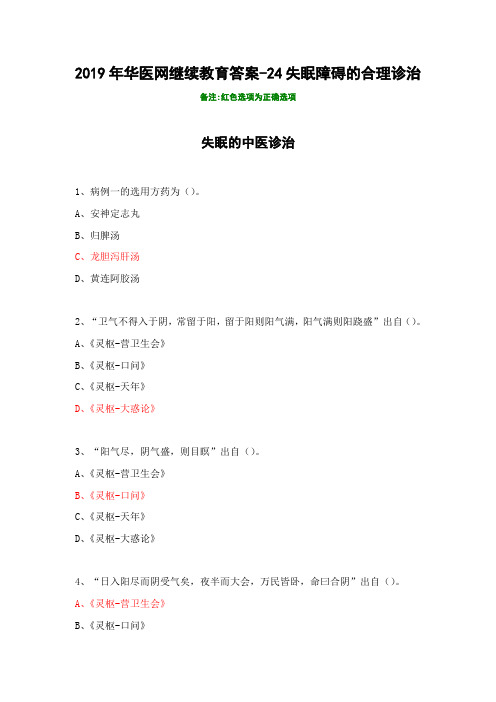
B、无抗焦虑、肌肉松弛作用
C、影响健康人的生理睡眠结构
D、可缩短入睡潜伏期
E、减少夜间觉醒次数和时间
6、下面哪项不是快速动眼睡眠期的特点()
A、快波睡眠
B、恢复记忆力
C、神经元活动增强
D、无明显的眼球运动
E、常常做梦
7、睡眠的心理行为治疗不包括()
A、睡眠卫生教育
B、刺激控制疗法
C、睡眠限制疗法
E、≥5个月
5、曾经存在失眠发作的人群的再次发病率是其他普通人群的()倍
A、3.5
B、4.5
C、5.4
D、6.5
E、7.4
6、药物治疗失眠症,推荐用药顺序首选()
A、短、中效的苯二氮卓受体激动剂或褪黑素受体激动剂
B、具有镇静作用的抗抑郁剂
C、巴比妥类药物
D、抗组胺药
E、抗癫痫药或抗精神病药
7、关于药物治疗失眠症,以下叙述错误的是()
3、()是原发性失眠和5-羟色胺(5一HT)再摄取抑制剂治疗抑郁引起的失眠的首选治疗药物。
A、巴比妥类
B、苯二氮卓类
C、非苯二氮卓类
D、抗抑郁药
4、苯二氮卓类药治疗失眠的临床有效率大概在()。
A、20%~30%
B、50%~60%
C、60%~70%
D、70%~80%
5、长期或慢性失眠,病程大于()。
A、4周
C、3月21日
D、3月22日
E、4月21日
中国失眠症诊断和治疗指南
1、治疗失眠症的总体目标是()
A、增加有效睡眠时间和(或)改善睡眠质量
B、改善失眠相关性日间损害
C、减少或防止短期失眠症向慢性失眠症转化
D、减少与失眠相关的躯体疾病或精神障碍共病的风险
原发性失眠诊断标准

原发性失眠诊断标准
原发性失眠是指在没有其他明显原因的情况下,持续难以入睡或维持睡眠的症状。
根据《国际疾病分类第十版》(ICD-10)的诊断标准,原发性失眠是一种常见的睡眠障碍,严重影响睡眠质量和日常生活。
因此,正确的诊断对于患者的治疗和管理至关重要。
临床上,对于原发性失眠的诊断,需要综合考虑患者的症状、病史和相关的检查结果。
根据《美国精神疾病诊断与统计手册第五版》(DSM-5)的诊断标准,原发性失眠的诊断应符合以下条件:
1. 主观睡眠困难,患者主诉难以入睡或维持睡眠,导致白天疲倦、精神不集中等功能受损。
2. 症状持续时间,睡眠困难至少持续3个月。
3. 睡眠质量受损,睡眠困难导致患者的睡眠质量受损,表现为睡眠时间不足、睡眠不深、易醒等。
4. 排除其他原因,睡眠困难不能归因于其他睡眠障碍、精神障碍、药物或物质的影响,且不是由于其他医学状况所致。
在进行原发性失眠的诊断时,医生需要详细了解患者的睡眠情况、日常作息习惯、精神状态等信息。
此外,还需要进行相关的体格检查和实验室检查,以排除其他可能导致睡眠困难的原因。
在一些情况下,医生可能会要求患者进行睡眠监测,以更全面地了解其睡眠情况。
除了以上的诊断标准外,医生在诊断原发性失眠时还需要考虑患者的年龄、性别、心理状态等因素。
对于老年人和儿童,睡眠障碍的表现可能不同于成年人,因此在诊断时需要特别注意。
总之,对于原发性失眠的诊断,医生需要综合考虑患者的症状、病史和相关检查结果,排除其他可能的原因,以确保诊断的准确性。
只有正确的诊断,才能为患者提供有效的治疗和管理措施,帮助其改善睡眠质量,提高生活质量。
原发性失眠的护理研究进展

原发性失眠的护理研究进展摘要:目的:研究原发性失眠的护理效果与进展。
方法:选取2020.01月-2021.01月我院接受的原发性失眠患者60例,采用随机分组的方式,将其分成对照组与实验组,比对两组患者睡眠质量。
结果:实验组各项睡眠改善指标均优于对照组,P<0.05。
结论:在对原发性失眠患者治疗的时候,需要积极地将护理操作引入其中,运用中医学中的生物反馈治疗干预模式,可以切实的提升患者的睡眠质量,该方式可运用。
关键词:原发性失眠;护理;睡眠质量;生物反馈治疗根据数据调查发现,我国有35%左右的老年群体患有原发性失眠疾病。
若是没有得到及时与有效的治疗,睡眠中会导致患者诱发其他的躯体性疾病,导致治疗的难度明显增加,患者生活质量显著降低【1-2】。
这就需要积极的探索临床护理措施,从而有效地改善患者睡眠质量,促使原发性失眠疾病治疗的安全性和有效性提升。
中医学中对该疾病治疗有较多方法。
基本此,本文将主要分析原发性失眠护理研究的效果进展,报道如下:1.一般资料与方法1.1一般资料选取2020.01月-2021.01月我院接受治疗的原发性失眠患者60例,采用随机分组的方式,将其分成对照组与实验组,每组30例。
对照组中男19例,女11例,平均(73.75±7.54)岁;实验组男18例,女12例,平均(73.28±7.04)岁。
一般资料(P>0.05)。
1.2方法1.2.1对照组护理干预:依照患者的实际状况,制定出针对性的护理方案。
例如,通过对室内光线调节、温湿度调节、隔绝噪音、铺整床褥、摆放饰品等方式,给患者营造出优质的住院环境,确保患者在住院期间能够身心舒适,促使患者快速入眠。
还需要了解到患者心理健康状况,与患者深入的交流和沟通,能够做到耐心倾听,积极地鼓励患者对患者的情绪进行安抚和照顾。
对患者实施健康教育,运用音乐干预模式,促使患者能够放松将患者存在的负性情绪有效改善。
患者生活习惯和饮食习惯进行规范。
原发性失眠相关标准及量表的选择与应用
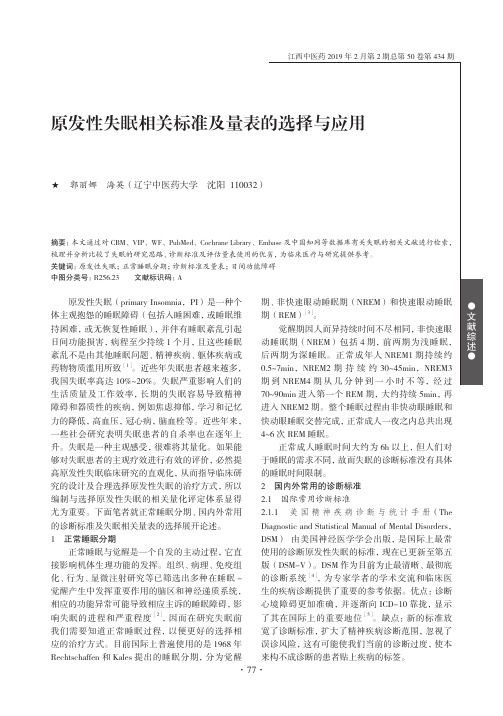
★郭丽娜 海英(辽宁中医药大学 沈阳 110032)摘要:本文通过对CBM、VIP、WF、PubMed、Cochrane Library、梳理并分析比较了失眠的研究思路、关键词:原发性失眠;正常睡眠分期;诊断标准及量表;中图分类号:R256.23 文献标识码:A原发性失眠(primary Insomnia,PI)是一种个体主观抱怨的睡眠障碍(包括入睡困难,或睡眠维持困难,或无恢复性睡眠),并伴有睡眠紊乱引起日间功能损害,病程至少持续1个月,且这些睡眠紊乱不是由其他睡眠问题、精神疾病、躯体疾病或药物物质滥用所致[1]。
近些年失眠患者越来越多,我国失眠率高达10%~20%。
失眠严重影响人们的生活质量及工作效率,长期的失眠容易导致精神障碍和器质性的疾病,例如焦虑抑郁,学习和记忆力的降低,高血压,冠心病,脑血栓等。
近些年来,一些社会研究表明失眠患者的自杀率也在逐年上升。
失眠是一种主观感受,很难将其量化。
如果能够对失眠患者的主观疗效进行有效的评价,必然提高原发性失眠临床研究的直观化,从而指导临床研究的设计及合理选择原发性失眠的治疗方式,所以编制与选择原发性失眠的相关量化评定体系显得尤为重要。
下面笔者就正常睡眠分期、国内外常用的诊断标准及失眠相关量表的选择展开论述。
1 正常睡眠分期正常睡眠与觉醒是一个自发的主动过程,它直接影响机体生理功能的发挥。
组织、病理、免疫组化、行为、显微注射研究等已筛选出多种在睡眠-觉醒产生中发挥重要作用的脑区和神经递质系统,相应的功能异常可能导致相应主诉的睡眠障碍,影响失眠的进程和严重程度[2],因而在研究失眠前我们需要知道正常睡眠过程,以便更好的选择相应的治疗方式。
目前国际上普遍使用的是1968年Rechtschaffen和Kales提出的睡眠分期,分为觉醒70~90min进入第一个REM期,大约持续5min,再进入NREM2期。
整个睡眠过程由非快动眼睡眠和快动眼睡眠交替完成,正常成人一夜之内总共出现4~6次REM睡眠。
中国失眠症诊断和治疗指南(完整版)

中国失眠症诊断和治疗指南(完整版)失眠是一种常见的睡眠问题,指难以入睡、早醒、睡眠质量差以及白天疲乏等症状。
根据ICSD-3的定义,失眠症可以分为原发性失眠症和继发性失眠症。
原发性失眠症指无明显诱因引起的长期失眠,而继发性失眠症则是由其他疾病或药物等因素引起的失眠。
二、失眠症的流行病学失眠症在成人中的患病率约为10%-15%,其中女性比男性更容易患上失眠症。
失眠症的发病率随年龄增加而增加,老年人患病率更高。
此外,失眠症在心理疾病、慢性疾病和应激事件等情况下更容易发生。
三、失眠症的影响失眠症会严重损害患者的身心健康,影响患者的生活质量,甚至可能导致交通事故等意外而危及个人及公共安全。
此外,失眠症还会增加患者的医疗费用和社会负担。
第三部分失眠症的诊断一、诊断标准根据ICSD-3的定义,诊断原发性失眠症需要满足以下标准:1)存在睡眠障碍症状至少3个月;2)睡眠障碍症状严重影响日常生活;3)排除其他原因引起的失眠症状。
继发性失眠症的诊断则需要确定引起失眠症的原因。
二、评估工具评估失眠症需要使用合适的工具,包括睡眠日志、睡眠质量问卷、白天疲乏量表和焦虑抑郁量表等。
第四部分失眠症的治疗一、非药物治疗非药物治疗包括认知行为治疗、睡眠保健教育、睡眠环境调整、物理治疗和中医药治疗等。
认知行为治疗是一种有效的非药物治疗方法,包括睡眠限制、睡眠压力管理和睡眠卫生教育等。
睡眠保健教育包括睡眠惯的调整和生活方式的改变。
睡眠环境调整包括改善睡眠环境的噪音、光线和温度等。
物理治疗包括音乐疗法、温泉疗法和按摩等。
中医药治疗则包括中药治疗和针灸治疗等。
二、药物治疗药物治疗应该根据患者的症状和病情进行个体化治疗。
常用的药物包括非苯二氮䓬类药物、催眠药和抗抑郁药等。
药物治疗应该注意剂量和用药时间,避免依赖和滥用药物。
三、综合治疗综合治疗是指将非药物治疗和药物治疗相结合的治疗方法。
综合治疗可以提高治疗效果,减少药物副作用和依赖。
总之,本指南为临床医师、护理人员、药剂师和心理学家等提供了规范化的失眠诊疗框架,旨在提高失眠症的诊断和治疗水平,减轻失眠症对患者和社会的负担。
巳时扶阳针灸法对失眠病患者睡眠质量、日间功能的影响

巳时扶阳针灸法对失眠病患者睡眠质量、日间功能的影响陈小云;胡子衡;梁凤好【摘要】目的探讨巳时扶阳针灸法对失眠病患者睡眠质量、日间功能的影响.方法纳入我院2015年4月-2016年12月经门诊收治入院接受治疗的失眠患者90例,采用随机数表法分为观察组和对照组,每组45例.其中观察组患者给予巳时扶阳针灸法治疗,20 ~30 min/次,1次/日;对照组患者给予巳时常规针灸法治疗,20 ~30 min/次,1次/日.2组治疗时间均为1个月.比较2组疗效、睡眠质量改善情况及安全性.结果观察组显效率显著优于对照组(P<0.05).治疗1个月后,观察组患者的睡眠质量均显著改善,治疗前后比较差异具有显著统计学意义(P<0.05),且与对照组患者比较差异具有显著统计学意义(P<0.05).除生活能力外,观察组患者的日常功能得到显著改善,治疗前后比较差异具有显著统计学意义(P<0.05),且治疗后与对照组患者比较,差异具有显著统计学意义(P<0.05).2组患者在治疗期间无严重不良反应发生.结论巳时扶阳针法治疗失眠病患者的疗效优于巳时常规针灸法治疗,且能够显著改善患者的睡眠质量和日间功能,对于改善失眠病患者的生活质量具有更积极的作用,因而值得在临床广泛推广应用.【期刊名称】《光明中医》【年(卷),期】2018(033)004【总页数】3页(P550-552)【关键词】巳时扶阳针灸;失眠;睡眠质量;日间功能【作者】陈小云;胡子衡;梁凤好【作者单位】肇庆市端州区华佗医院治未病/中医儿科广东肇庆526040;肇庆市端州区华佗医院治未病/中医儿科广东肇庆526040;肇庆市端州区华佗医院治未病/中医儿科广东肇庆526040【正文语种】中文目前,失眠的治疗主要分为药物治疗和非药物治疗。
有研究表明,约有22%的失眠患者通过定期服用抗失眠药物来缓解失眠症状[1]。
临床上治疗失眠的药物主要有苯二氮类受体激动剂、褪黑素受体激动剂以及具有镇静作用的抗抑郁药物。
睡眠障碍、失眠习题及答案

睡眠障碍、失眠习题及答案选择题:1.关于失眠的说法,错误的是(B)A.偶尔失眠关系不大,长期失眠必须及时治疗B.失眠是正常的事情,无需理会C.长期失眠会影响身体健康D.失眠不可怕,只要采用科学方法治疗,一般都能改善或痊愈2. 2002年全球10个国家失眠流行病学研究结果显示(C)的中国人在过去1个月中曾经历过不同程度失眠。
A.12.3%B.23.5%C.45.4%D.82.43.关于失眠的定义,正确的是(A)A. 通常指患者对睡眠时间和(或)质量不满足并影响日间社会功能的一种主观体验B. 指患者睡眠时间不够C. 指患者质量不满足D.睡眠时间和质量都不好4.入睡困难是指(B)时间不能入睡?A.2hB.30minC.10minD.5min5.失眠根据病程可分为(D )A.急性失眠B.亚急性失眠C.慢性失眠D.以上都是6.慢性失眠的病程时间是指(D )A. 病程≥1个月B. 病程≥1个月,<6个月C. 病程≥3个月D. 病程≥6个月7. 失眠按病因可划分(A )类A. 为原发性和继发性两类B. 为原发性、继发性和散发性三类C. 为原发性和散发性两类D. 为原发性、继发性、散发性和再发性四类8.原发性失眠包括哪几种类型(D )A. 包括心理生理性失眠B. 包括特发性失眠C. 包括主观性失眠D. 主要包括心理生理性失眠、特发性失眠和主观性失眠3种类型9.失眠症病史采集的过程中要特别关注(B )A. 抗高血压药物使用史B. 抗抑郁药、中枢兴奋性药物、镇痛药、镇静药、茶碱类药、类固醇以及酒精等精神活性物质滥用史C.所有用药史同等对待D.无需特别关注10. 存在以下哪些症状之一时,应考虑失眠()A. 入睡困难、睡眠维持障碍B. 早醒、睡眠质量下降或日常睡眠晨醒后无恢复感C. 日常睡眠晨醒后无恢复感D. 入睡困难、睡眠维持障碍、早醒、睡眠质量下降或日常睡眠晨醒后无恢复感11. 对于急性失眠患者宜( A )A. 早期应用药物治疗B. 先不处理C. 先用心理治疗D. 早期用认知行为治疗12. 目前临床治疗失眠的药物主要包括(D )A.苯二氮卓类受体激动剂(benzodiazepine receptor agonists, BZRAs)B.褪黑素受体激动剂C.具有催眠效果的抗抑郁药物D.以上都是13.可以作为治疗失眠的常规药物的是(B )A. 抗组胺药物(如苯海拉明)B.苯二氮卓类受体激动剂C.缬草提取物D. 褪黑素14.以下不属于苯二氮卓类的是(D )A. 艾司唑仑( estazolam)B.氟西泮( flurazepam )C.夸西泮( quazepam )D.奥氮平15. 以下哪种药物未获美国FDA批准用于失眠的治疗()A. 夸西泮( quazepam )B.替马西泮(temazepam)C.地西伴(diazepam )、D. 三唑仑(triazolam)16. 在国内( D )属一类精神药品管理,不推荐用于失眠的治疗A. 夸西泮( quazepam )B.替马西泮(temazepam)C.地西伴(diazepam )、D. 三唑仑(triazolam)17.苯二氮卓类的不良反应主要为( D )A. 日间困倦、头昏B.肌张力减退、跌倒C.认知功能减退D.以上都是18. 老年失眠患者服药时尤须注意药物的肌松作用和(B )A. 日间困倦B. 跌倒风险C. 认知功能减退D.无需特别注意19. 以下不属于非苯二氮卓类的催眠药物是()A.地西泮B. 佐匹克隆(zopiclone)C.右佐匹克隆(eszopiclone)D.扎来普隆20. 阿戈美拉汀(C )A. 褪黑素受体激动剂B. 5-羟色胺受体拮抗剂C.既是褪黑素受体激动剂也是5-羟色胺受体拮抗剂D. 既不是褪黑素受体激动剂也不是5-羟色胺受体拮抗剂21. 阿戈美拉汀具有(C )A. 抗抑郁B. 催眠C. 抗抑郁和催眠双重作用D. 既不能抗抑郁,也不能催眠22.关于三环类抗抑郁药物,说法错误的是( D )A. 能够缩短睡眠潜伏期、减少睡眠中觉醒B. 增加睡眠时间、提高睡眠效率C. 但其同时减少慢波睡眠,不同程度减少REM睡眠D. 作为失眠的首选药物23.关于选择性5-色胺再摄取抑制剂,说法错误的是( D )A.虽无明确催眠作用,但可以通过治疗抑郁和焦虑障碍而改善失眠症状。
失眠症的类型

失眠症的类型失眠按病因可划分为原发性和继发性两类。
1.原发性失眠通常缺少明确病因,或在排除可能引起失眠的病因后仍遗留失眠症状,主要包括心理生理性失眠、特发性失眠和主观性失眠3种类型。
原发性失眠的诊断缺乏特异性指标,主要是一种排除性诊断。
当可能引起失眠的病因被排除或治愈以后,仍遗留失眠症状时即可考虑为原发性失眠。
心理生理性失眠在临床上发现其病因都可以溯源为某一个或长期事件对患者大脑边缘系统功能稳定性的影响,边缘系统功能的稳定性失衡最终导致了大脑睡眠功能的紊乱,失眠发生。
2.继发性失眠包括由于躯体疾病、精神障碍、药物滥用等引起的失眠,以及与睡眠呼吸紊乱、睡眠运动障碍等相关的失眠。
失眠常与其他疾病同时发生,有时很难确定这些疾病与失眠之间的因果关系,故近年来提出共病性失眠comorbid insomnia的概念,用以描述那些同时伴随其他疾病的失眠。
1.睡眠过程的障碍入睡困难、睡眠质量下降和睡眠时间减少。
2.日间认知功能障碍记忆功能下降、注意功能下降、计划功能下降从而导致白天困倦,工作能力下降,在停止工作时容易出现日间嗜睡现象。
3.大脑边缘系统及其周围的植物神经功能紊乱心血管系统表现为胸闷、心悸、血压不稳定,周围血管收缩扩展障碍;消化系统表现为便秘或腹泻、胃部闷胀;运动系统表现为颈肩部肌肉紧张、头痛和腰痛。
情绪控制能力减低,容易生气或者不开心;男性容易出现阳萎,女性常出现性功能减低等表现。
4.其他系统症状容易出现短期内体重减低,免疫功能减低和内分泌功能紊乱。
心理因素,例如情绪紧张不安,心情抑郁,过于兴奋、生气愤怒等能引起失眠。
有学者研究出现,在300例失眠患者中,其中85%的人是由于心理因素引起的。
忧郁症、神经衰弱、精神分裂症的病人大多失眠。
心理因素对失眠有着重要的影响,反过来失眠又影响到人的心理。
失眠使人精力不足,精神萎靡,注意力不集中,情绪低沉,使人急躁、紧张、易发脾气,降低人的学习效率与工作效率。
长期失眠有可能使人的感受能力降低,记忆力减退,思维的灵活性减低,计算能力下降,还会使人的情绪状态发生一些改变。
- 1、下载文档前请自行甄别文档内容的完整性,平台不提供额外的编辑、内容补充、找答案等附加服务。
- 2、"仅部分预览"的文档,不可在线预览部分如存在完整性等问题,可反馈申请退款(可完整预览的文档不适用该条件!)。
- 3、如文档侵犯您的权益,请联系客服反馈,我们会尽快为您处理(人工客服工作时间:9:00-18:30)。
论 著原发性失眠主客观睡眠质量与日间功能损害的关系刘红1,杨劲2,唐向东1【摘要】 目的 探讨原发性失眠患者日间功能损害及其影响因素。
方法 选取2010年3月-12月符合美国《精神障碍诊断与统计手册》第4版诊断标准的原发性失眠者62例,另选择性别、年龄匹配的健康睡眠者53例。
失眠组和对照组均采用匹茨堡睡眠质量指数量表(PSQI)评估1个月的主观睡眠质量,多导睡眠监测(PSG)评估客观睡眠质量,并通过“主观睡眠时间/客观睡眠时间×100%”计算睡眠知觉,PSG监测后受试者完成一系列日间功能评定,包括Epworth嗜睡量表(ESS)评价嗜睡程度、Flinders疲劳量表(FFS)评价疲劳程度、贝克抑郁量表(BDI)和状态-特质焦虑量表(STAI)评估情绪状态。
结果 ① 与对照组相比,失眠组主客观睡眠质量均较差;PSQI分数更高[(14.37 ± 2.44)、(2.74 ± 1.79)分,P<0.001)];睡眠知觉差[(49.76 ± 33.29)、(99.36 ± 12.79)分,P<0.001)]。
② 失眠组FSS、BDI、SAI、TAI分数明显高于对照组,ESS分数低于对照组(P值均<0.05)。
③ PSQI总分与ESS呈负相关(r=−0.17,P<0.01),与FSS、BDI、SAI、TAI分数呈正相关(r=0.54,r=0.66,r=0.70,r=0.87)(P值均<0.01)。
客观睡眠时间与ESS(r=−0.01,P=0.138)、FSS(r=−0.02,P=0.019)、BDI(r=−0.03,P=0.022)、SAI(r=−0.03,P=0.086)、TAI(r=−0.04,P=0.015)分数均无明显相关性。
结论 原发性失眠者主观睡眠质量与多项日间功能损害相关,这为有效的治疗失眠和改善日间症状提供理论依据。
【关键词】 原发性失眠;日间功能;主观睡眠质量【文献标识码】 A DOI:10.7507/1002-0179.20130067Association between Sleep Quality and Impaired Daytime Functioning in Patients with Primary Insomnia LIU Hong1,YANG Jin2, TANG Xiang-dong1. 1. Department of Sleep Medicine Center, West China Hospital, Sichuan University, Chengdu,Sichuan 610041, P. R. China; 2. Maternal and Child Health Hospital of Jingbian, Jingbian, Shaanxi 718500, P. R. China Corresponding author: TANG Xiang-dong, E-mail: xiangdong.tang@【Abstract】 Objective To investigate impaired daytime functioning and its influence factors in patients with primary insomnia (PI). Methods From March to December 2010, 62 PI patients and 53 good sleeper controls (GSC)matched on age and sex were included in the study. All participants completed the Pittsburgh Sleep Quality Index (PSQI)assessment, including all-night polysomnography (PSG), a battery of daytime functioning questionnaires and a medicaldisorders checklist. The daytime functioning assessment included Epworth Sleepiness Scale (ESS), Flinders Fatigue Scale(FSS), Beck Depression Inventory (BDI), and State-trait Anxiety Inventory (STAI). Sleep perception was calculated assubjective sleep time/objective sleep time×100%. Results PI patients demonstrated significant impairment on sleepquality compared with GSC. PI patients had signifi cantly greater scores of PSQI than the controls (14.37 ± 2.44, 2.74 ± 1.79;P<0.001). The mean sleep perception scores were 49.76 ± 33.29 for the insomniacs and 99.36 ± 12.79 for the controls(P<0.001). Compared with the controls, PI patients had signifi cantly greater scores of FFS, BDI, and STAI. However, PIpatients experienced lower score of ESS compared with GSC. These differences were all statistically signifi cant (P<0.05).The total PSQI score was negatively correlated with ESS (r=–0.17, P<0.01), and positively correlated with FSS, BDI,SAI, and TAI (r=0.54, r=0.66, r=0.70, r=0.87) (P<0.01). Objective sleep time was not obviously correlated with ESS(r=−0.01, P=0.138), FSS (r=−0.02, P=0.019), BDI (r=−0.03, P=0.022), SAI (r=−0.03, P=0.086), TAI (r=−0.04, P=0.015).Conclusion Individual subjective sleep quality is related to various daytime functioning impairments, which provides atheoretical basis for the treatment of insomnia and improvement of daytime symptoms.【Key words】 Primary insomnia; Daytime function; Subjective sleep qualityFoundation item: National Natural Science Foundation (81170072/HO113)【基金项目】国家自然科学基金面上项目(81170072/HO113)【作者单位】 1 四川大学华西医院睡眠医学中心(成都,610041);2 靖边县妇幼保健院儿科【作者简介】刘红(1986-),女,四川宜宾人,在读硕士,E-mail:liuhong410@【通讯作者】唐向东,E-mail:xiangdong.tang@【网络出版时间】 2013-02-06 18:29【网络出版地址】 /kcms/detail/51.1356.R.20130206.1829.014.html原发性失眠是一种个体主观抱怨的睡眠障碍(包括入睡困难,或睡眠维持困难,或无恢复性睡眠),并伴有睡眠紊乱引起日间功能损害,病程至少持续1个月,且这些睡眠紊乱不是由其他睡眠问题、精神疾病、躯体疾病或药物物质滥用所致[1]。
流行病学数据显示成人原发性失眠患病率约6%[2]。
失眠的日间症状主要包括:疲乏、日间嗜睡、情绪障碍、认知功能下降、社会或职业功能受损等,但关于失眠患者白天是否嗜睡尚无一致结论[3, 4]。
以前的研究提出主观睡眠质量影响日间症状,而仅有客观睡眠不足而无主观失眠主诉者与对照组在日间症状上无差异[5, 6]。
我们比较了原发性失眠患者与健康对照组在疲乏、嗜睡、焦虑、抑郁等日间症状方面的差异,以及睡眠质量与日间功能损害的关系,籍以了解主观和客观睡眠质量在影响原发性失眠患者日间功能上的重要性,为进一步阐明原发性失眠的日间功能损害的发病机制提供理论依据,为有效的改善其日间症状提供方向。
1 资料与方法1.1 一般资料随机抽取2010年3月-12月、以失眠为主诉、就诊于我中心的门诊患者。
原发性失眠组纳入标准为:① 年龄18~65岁;② 符合美国《精神障碍诊断与统计手册》第4版(DSM-Ⅳ)原发性失眠诊断标准;③ 近3个月未使用镇静安眠类药物;④ 能理解各项日间功能量表条文并完成评定;⑤ 同意参加调查并签署书面知情同意书。
健康对照者为人群中招募的健康睡眠者,纳入标准:① 无睡眠障碍主诉;② 能理解本调查中的量表条文;③ 同意参加调查并签署书面知情同意书。
所有参与者排除标准如下:存在心、肝、肾等严重器质性疾病;并存躯体疾病或神经精神系统疾病而导致睡眠障碍者(如疼痛、帕金森病等);药物物质依赖者(如酒精、咖啡等);不能完成日间功能量表评定;其他睡眠障碍;多导睡眠监测(PSG):呼吸暂停/低通气指数(AHI)>15次/h,或睡眠周期性腿动(PLMS)指数>15次/h。
所有研究对象由我院睡眠中心医生进行资料收集:基本情况(性别、年龄、种族、学历、身高、体重),既往史,药物史。
初筛后受试者完成匹茨堡睡眠质量指数量表评定(PSQI)。
并于1周内进行PSG监测,在PSG监测第2天由研究者发放调查问卷,并就量表的填写方法和每个条目的含义进行规范专业的指导,由调查对象自行填写。
